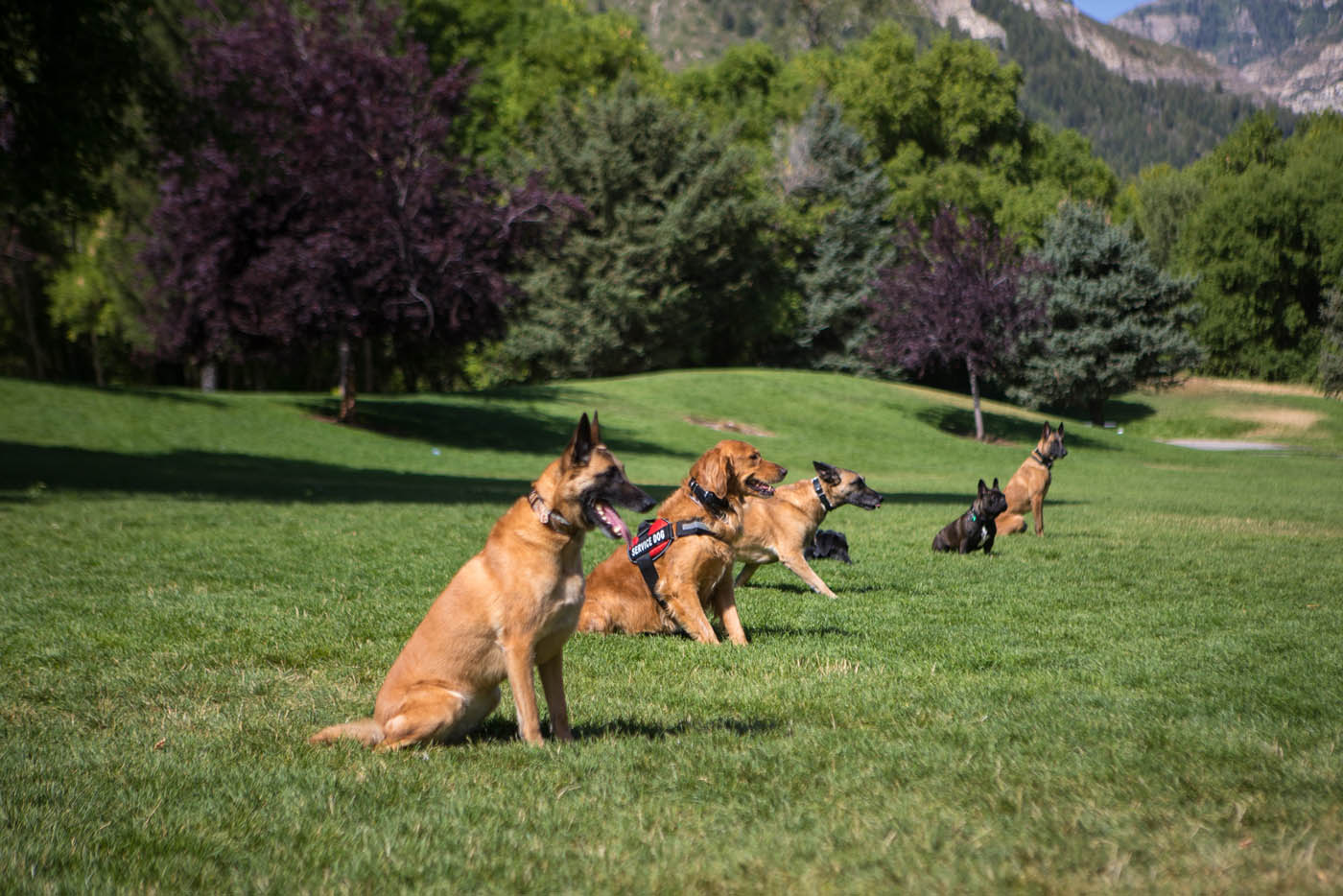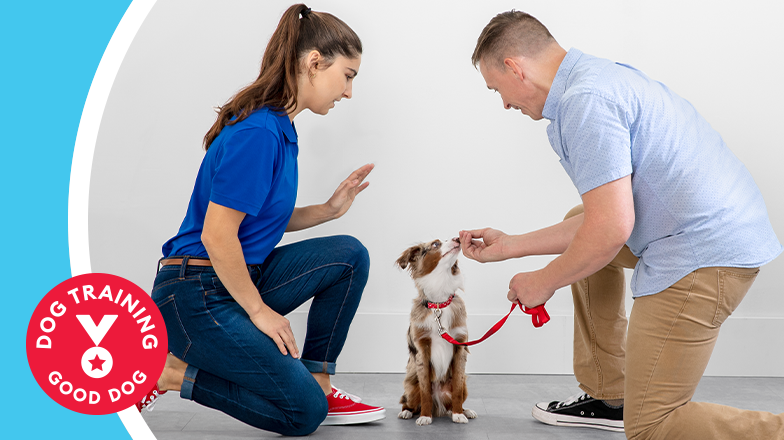Important Advice for Learning Dog Training in the house
Mastering dog training at home requires a critical technique. Positivity, patience, and consistency are vital parts. Developing a regular aids produce a complacency for the pet dog. Utilizing positive reinforcement builds trust and communication. Several proprietors have a hard time with maintaining rate of interest and engagement during training sessions. Comprehending exactly how to browse these challenges can cause a lot more reliable training end results. What strategies may be most valuable in getting rid of these usual challenges?
Establish a Consistent Routine
When educating a pet dog, developing a regular regimen is important for promoting etiquette and a strong bond between the proprietor and pet dog. An organized schedule supplies canines with a feeling of security, assisting them comprehend what to anticipate daily. Routine feeding times, exercise, and training sessions develop a predictable atmosphere, which can reduce anxiousness and advertise a feeling of stability.
Owners need to aim to include everyday activities at the same time to strengthen this regimen. Early morning strolls, play, and training exercises need to happen continually. In addition, integrating commands and hints throughout these activities can further enhance knowing.
Use Favorable Support
A constant regular lays the groundwork for efficient training, but the approaches made use of throughout training sessions considerably influence a pet's learning experience. Positive reinforcement becomes a powerful tool in shaping preferred habits. This strategy involves awarding a pet dog for showing certain actions, effectively urging them to duplicate those habits (Dog Training Near Me). Incentives can consist of treats, appreciation, or play, developing a favorable organization with the action done
Making use of favorable support promotes a bond of count on between the pet and trainer, improving interaction and understanding. It is vital to supply benefits immediately after the desired actions to reinforce the connection. Uniformity in using this strategy assures the dog can clearly associate the behavior with the incentive. Moreover, preventing punishment or adverse support can result in a much more enthusiastic and certain learner. By concentrating on positive reinforcement, instructors can create a supportive atmosphere where pet dogs grow and learn efficiently.
Keep Training Sessions Short and Fun
Reliable canine training needs keeping sessions brief and engaging to maintain the canine's interest and interest. Commonly, sessions must last no longer than 10 to 15 mins, as pet dogs have actually restricted focus spans. By concentrating on brief periods, instructors can protect against disappointment for both the pet dog and the handler, improving the finding out experience.
Including play and positive communications right into training can make sessions delightful. Utilizing playthings, treats, or appreciation as benefits not only motivates the pet however additionally strengthens the bond between the animal and trainer. Transforming activities regularly can also assist maintain the pet dog's passion active, as different jobs stimulate mental interaction.
Moreover, ending each session on a favorable note, such as commemorating a little triumph, assures the canine associates training with fun. Eventually, keeping training sessions delightful and brief promotes reliable knowing and strengthens the overall training procedure.
Establish Realistic Goals
Establishing practical goals is crucial for successful pet dog training. Fitness instructors ought to start by examining their dog's present skills and behavior tendencies, allowing them to develop achievable purposes. For instance, instead of going for complicated commands, starting with fundamental cues like "rest" or "remain" can foster a sense of achievement.
Additionally, damaging down bigger objectives into smaller sized, workable actions helps preserve inspiration for both the fitness instructor and the dog. This technique also permits for adjustments in the process, ensuring that difficulties do not come to be frustrating.
Furthermore, it is very important to recognize that each pet dog finds out at its very own speed; patience is essential. Keeping expectations grounded assists protect against stress and encourages constant progression. Dog Training Near Me. To conclude, setting sensible objectives not just boosts the training experience yet also strengthens the bond between the pet dog and the instructor, bring about an extra unified and effective training trip
Mingle Your Pet dog
Attaining realistic training goals lays the groundwork for a well-shaped dog, but socializing plays a significant role in a dog's development. Interacting socially a pet dog entails subjecting it to different atmospheres, individuals, and various other pets, which aids to construct self-confidence and minimize stress and anxiety. Early socialization, ideally between three and fourteen weeks of age, is important for shaping a pet's actions and personality. This direct exposure permits pet dogs to discover suitable interactions and develop essential social skills.
Owners should present their pet dogs to different scenarios gradually, guaranteeing each experience is gratifying and positive. Checking out parks, going to puppy courses, or setting up playdates with other pets can promote these communications. Furthermore, observing other pet dogs and learning from their actions can even more boost a pet dog's social skills. Inevitably, positive and regular socialization fosters a well-adjusted canine that pleasantly browses different social settings throughout its life.
Hold Your Horses and Persistent

Perseverance is vital. Routine practice strengthens habits and commands, making certain that the canine preserves what has been discovered. It is very important to commemorate small triumphes, as they urge both the proprietor and the canine to keep advancing. Recognizing setbacks as part of the journey instead of failings can help keep motivation. Eventually, a person and consistent technique not just builds a stronger bond in between pet and proprietor but also lays the foundation for effective training and enduring obedience.

Include Educating Into Life
Including training into day-to-day live can boost a dog's understanding experience. Routine tasks, such as feeding or strolling, present valuable possibilities for positive support. By seamlessly mixing training with day-to-day actions, proprietors can cultivate much better actions in their animals with time.
Daily Routine Assimilation
Just how can canine proprietors perfectly mix training right into their everyday routines? By integrating training sessions right into daily tasks, proprietors can enhance their pet dog's understanding experience. For example, easy commands can be exercised during walks, such as "sit" prior to going across streets or "heel" while steering with parks. Feeding time offers another chance; owners can include commands like "wait" or "leave it" prior to offering the food dish. In addition, playtime can work as a training ground for commands like "fetch" or "drop it." Uniformity is key; by embedding training into routine tasks, pet dogs find out that commands are pertinent in different contexts. This technique not just enhances knowing however likewise strengthens the bond between the canine and its owner.
Positive Reinforcement Opportunities
Training opportunities abound throughout a pet dog's day-to-day life, specifically when incorporated with favorable support methods. Daily tasks give moments for training, such as throughout walks, feeding times, or play sessions. Rewarding a pet for resting prior to getting food improves obedience while fostering a positive organization with commands. In a that site similar way, commending a pet for comfortably greeting guests enhances preferable habits. Including training into playtime, like using bring to practice commands, can also work. Proprietors must stay consistent, using deals with, praise, or playthings as benefits to encourage etiquette. By integrating training seamlessly right into daily regimens, owners can grow a well-behaved pet dog while enhancing their bond, making the training process delightful for both celebrations.
Frequently Asked Concerns
What Age Is Best to Beginning Training My Dog?
Determining the finest age to start educating a dog differs; however, experts often suggest starting around 8 weeks. Early training fosters socialization, develops routines, and aids shape favorable behaviors, advertising a well-adjusted, loyal companion.
Exactly How Can I Stop My Pet Dog From Barking Exceedingly?
To decrease too much barking, one find out this here effective technique entails identifying triggers, giving constant training commands, and fulfilling quiet habits. In addition, regular exercise and psychological stimulation can aid minimize unneeded barking by addressing boredom or anxiousness.
What Should I Do if My Dog Ends Up Being Aggressive?
When a dog shows hostility, it is essential to remain calm and avoid fight. Determining triggers, looking for specialist help, and employing positive reinforcement methods can successfully take care of and decrease aggressive habits in pet dogs.
Exactly how Do I Pick the Right Training Devices?
Picking the right training tools includes examining the pet dog's personality, dimension, and training objectives. Research study different options, seek advice from professionals, and prioritize humane, effective devices that promote favorable support for an effective training experience.

Can I Train My Pet Dog Without Professional Assistance?
Educating a pet without professional assistance is viable for many proprietors. With commitment, persistence, and regular practice, individuals can successfully educate basic commands and strengthen favorable actions, fostering a strong bond between them and their animal.
A regular regular lays the foundation for effective training, however the techniques utilized throughout training sessions greatly influence a dog's discovering experience. Reliable pet training calls for maintaining sessions short and engaging to maintain the canine's attention and enthusiasm. Accomplishing reasonable training goals lays the groundwork for an all-round pet, yet socializing plays a substantial duty in a pet's growth. In addition, observing various Our site other pets and learning from their behaviors can further enhance a dog's social abilities. Picking the appropriate training devices includes assessing the canine's personality, training, and size objectives.